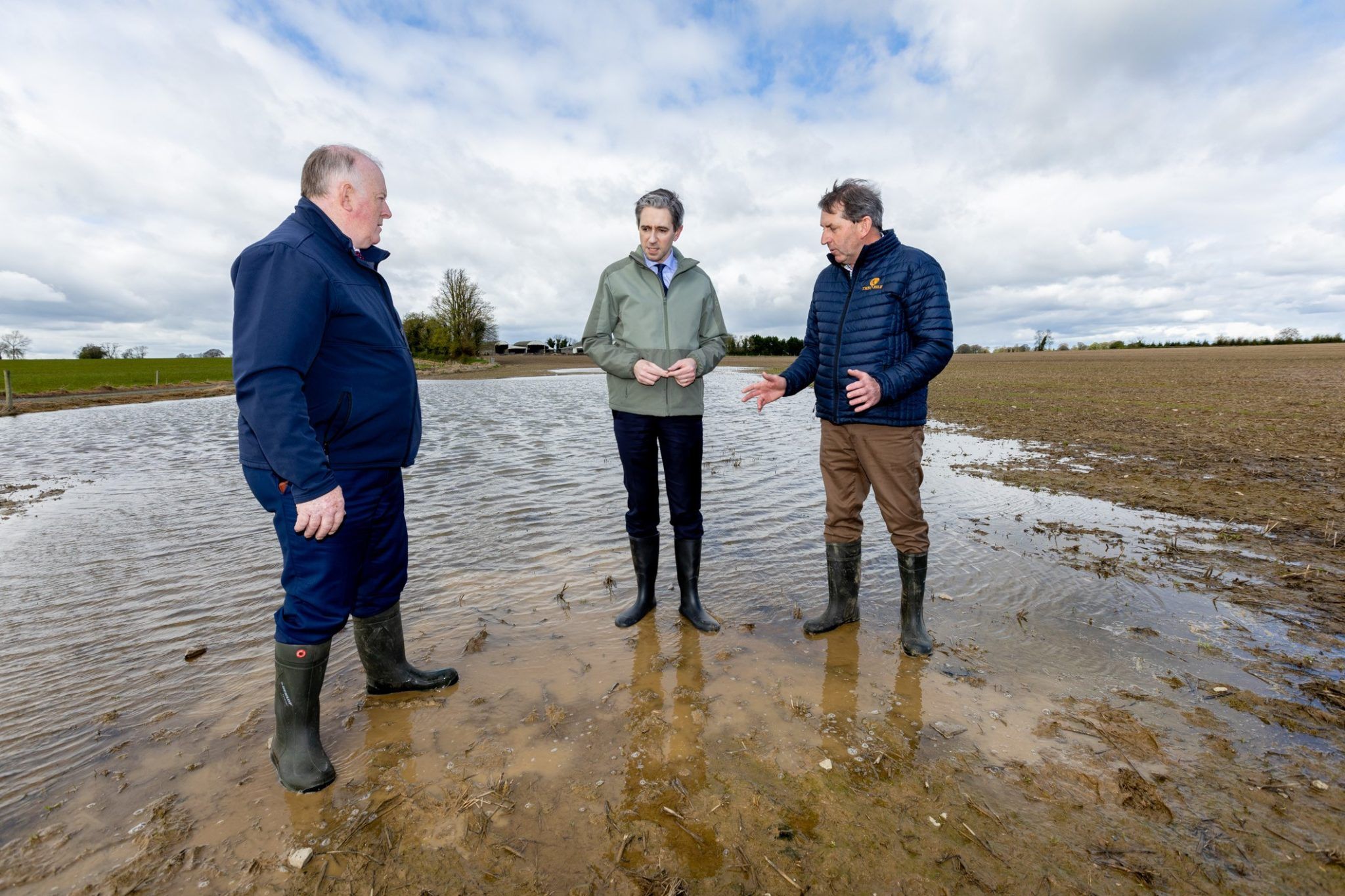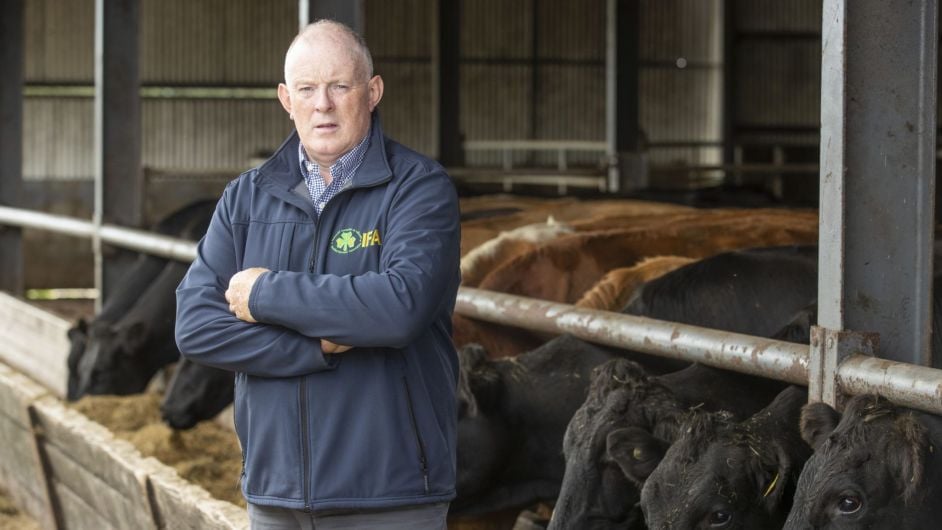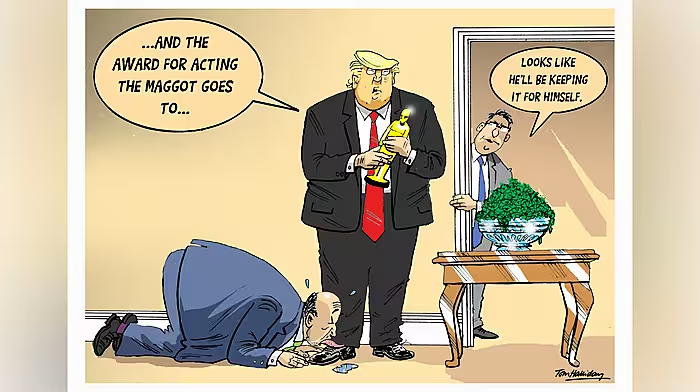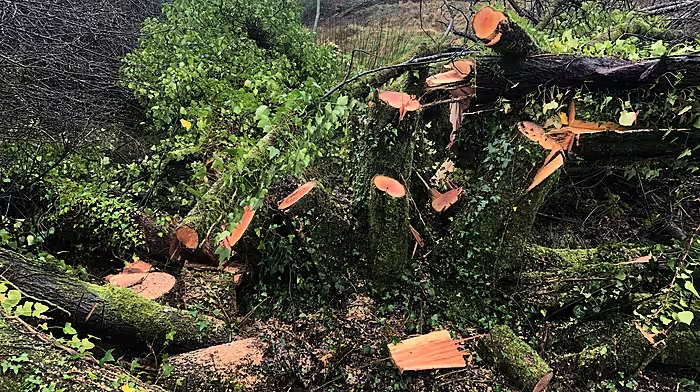IFA president Francie Gorman talked family, farming, and future with MARTIN CLAFFEY
This article appears in this week's Southern Star West Cork Farming magazine – pick up a copy in shops now for this interview and more!
WHEN your life takes you on the road every day, sometimes it’s nice to take that time out closer to home.
IFA president Francie Gorman knows that well.
‘Tommy went into fourth class in September. He’s nine. He’ll be 10 on December 1st. Actually, he has a great interest in all things IFA as well.
‘I’m very lucky of great support here from Kay and my little lad. I think both of them take great pride in me being IFA president and want to see me do the job as best I can.’
The human touch – being on the ground – is something Francie Gorman knows the value of. Indeed since taking the reins of the IFA from Tim Cullinan in January, the Laois man has certainly been no stranger to being on the ground in West Cork. His first official outing as president took him to the south-west and to West Cork IFA. ‘West Cork was one of the first visits I did after being elected,’ he notes.
‘Your job is to be seen on the ground with farmers, to have them feel that you’re there beside them, with them, that you understand what’s going on, that you’re going to fight for them as hard as you can. That local interaction is key. You couldn’t put a price in it.’
 IFA President Francie Gorman, An Taoiseach Simon Harris and farmer Charlie Farrell inspecting flooded land in Gowran, Co Kilkenny. (Photo: Michael O’Rourke)
IFA President Francie Gorman, An Taoiseach Simon Harris and farmer Charlie Farrell inspecting flooded land in Gowran, Co Kilkenny. (Photo: Michael O’Rourke)
Visiting West Cork gave the new IFA president a tangible grasp of what local farmers were feeling.
‘There’s huge concern in West Cork about the derogation and the need to hold on to it. It is one of the big, big issues that came up. The same in Cork Central.
‘And there’s fears, if you go further west in West Cork, over nature restoration and rewetting and how it is going to affect farms.
‘You can’t do everything you want, but the freedom to farm your land the way you want is a hugely important issue for us that we can’t give up on. That’s a red line issue.’
Francie Gorman says that farmers in West Cork must be allowed to do what they do best. ‘Within the lines of good agricultural practice that we’re farming to at the moment, if farmers are prepared to farm to those standards, they should be free to farm whatever way they want on their farms. Whether it’s dairy, beef, sheep, or growing tillage , they shouldn’t be restricted or told how to farm their land.
‘In terms of the nature restoration law, look, it’s been passed in Europe. Our government now is going to come forward with their own nature restoration plan. No discussions have started on it yet, but we’ve been looking forward to having discussions with Malcolm Noonan’s department and making sure that if they’re going to come with a nature restoration plan for the country, that it’s done in a way that allows farmers to farm their land in the main the way they do, to continue to farm in the way they’ve done for generations.’
The Minister for Agriculture Charlie McConalogue outlined his plans to help Ireland maintain the derogation last month, and the IFA worked in conjunction with industry groups to make farmers’ case. Francie knows that everyone has to be on board.
‘Teagasc would be on the outside of it, but they’re part of it. But with ICOS, Macra, ICMSA, Meat Industry Ireland, Dairy Industry Ireland, we’re working together. Our best chance of holding on to the derogation is to be able to come forward with some sort of a defined pathway, to have buy-in from the EPA, and get our government to lead a plan to Europe and convince them that we need more time. That’s where it’s really at.
‘Time is key. The government agreed a flawed review of the derogation back in the spring of 2022, and it led us to where we are today. We need to more time to assess the data. The improvements taken at farm level need to be given time to filter through. It can take years for practices on farm to deliver in actual water quality in our rivers.
‘We’ve the fourth best ground water quality in Europe. That’s not something you hear very often, and we’re not doing a bad job, and sometimes we shouldn’t beat ourselves up too much. But the reality is, if we’re going to hold on to our derogation, you want to see the really good water bodies maintaining their status. And the poor ones improving. And we’ve got to be able to show that that’s happening, but that we’re given time for that to filter through.’
West Cork 'no different to many other parts of the country'
The nagging fear over derogation is something which has been hanging over farmers in West Cork in recent years, with the dairy sector enduring further challenges over the past 12 months.
‘Production is back, costs are up. It’s a perfect storm, and the regulations around which farmers are expected to work, there seems to be something new coming down the tracks every day,’ said Francie. ‘The asks are becoming more and more defined, and that’s adding cost to people’s business as well. Labour is an issue on farms. The issues that are in West Cork are no different to many other parts of the country.’
Francie says the climate nature fund needs to have some kind of meat in the bone.
‘That climate fund is a capital fund now, for capital projects on farms. And we believe that fund should support the building of extra nutrient storage on farms, and that would allow farmers to spread them then through low-emission equipment at a better time of year. That’s a big one.’
Succeeding in overcoming these challenges will require discussion, and maybe more. Francie has been keen to stress the importance of first seeking a diplomatic approach.
‘People tend to focus on what you don’t get, instead of what you do achieve, and I understand that. But we’ve got a few things, I think, since January, and we’ve a reasonably good working relationship with the minister and with the taoiseach. We got the straw chopping turned around in August without putting a tractor on the road which I thought was really good – it was a good outcome for us and a good outcome for tillage farmers. With supports for the dairy sector, through the processors in the spring, when things were tough, I think we had success with that as well.
‘Relationship building is hugely important, whether it’s with the minister or with the processors, the dairy or beef processors, to be able to pick up the phone if you think something needs to be done.
‘There will be challenges down the road. But whatever way it is, whether it’s bridge building, or if we have to be more militant, whatever has to be done, we will do, to try and get delivery.’
The ‘Enough is Enough’ campaign in February saw farmers take the roads of West Cork and around the country to highlight their grievances, and they also took their protests to the local authorities ahead of local and European elections. Further displays of actions are likely, with joint initiatives with other farming lobby groups.
READ MORE: Great West Cork Farming Survey 2024 results
‘I think with the Enough is Enough campaign, we managed everywhere an election discussion went on, that agriculture was mentioned. That’s what we’ve got to do: try and make sure it’s central to discussions at the next election campaign,’ said Francie.
‘We need a united effort on behalf of rural Ireland to show that we’re still here, that we count, that we’re not going away.’
Communicating the message is a theme Francie is very passionate about, at every level. ‘There’s a lot of our own farming members, on a daily basis, might be aware of what goes on in the association, or maybe never will be. And I suppose the only time that they might have any interaction with me as president could be if they hear you on maybe Primetime or Six-One News or something so that whole communications area is critical.
‘There are issues that may be outside the farm gate that are not, maybe strictly farming, issues that are hugely important to people in rural Ireland, to young people trying to make a living and start to build a home, issues around planning and childcare, and I think it’s important that we have an opinion o n those as well.’
This space between agriculture and wider societal issues is being felt by many West Cork families, and Francie is well aware.
‘The whole planning process has become hugely problematic. And even aside from houses, the serial objectors objecting to development at farm level is a huge problem, and that’s something that the current planning bill, which is going through the Oireachtas, has to address.
‘Certainly, planning for houses in rural Ireland is becoming hugely problematic. Planning on to certain national roads around the country is an issue, something that we’re trying to address. So of course, we should be in that space. And I think, you know, if young people can see us trying to add value there in that space, I think it can only be positive for us.’
With the budget due on October 1st, the IFA has been actively lobbying on demands for members. A comprehensive 32-page budget submission was presented, and how those demands will be dealt with by Minister Charlie McConalogue and the government will be watched with interest.
‘It’s a huge budget. It’s going to be the last budget before an election, There’s plenty of money in the coffers there at the moment, and if they’re ever going to look after the little people, it’s going to happen in a time of surplus.
‘Amending the zoned residential land tax is not going to cost them anything. We need access to that climate nature fund of €3.15 billion. It could come on stream in 2026, and then we need to see the reliefs maintained that we have, and support for the vulnerable sectors.’
And around the corner from the budget will see an election on the horizon. ‘Our job is to make sure that agriculture has a central role in the discussions going on during the election campaign and we’d say to farmers: take part in those discussions, listen to them and go out and vote for candidates that are going to support our way of life in rural Ireland.’
So much to consider, and plenty to be thinking about. How does Francie get a break and some downtime.
‘IFA was downtime before I was elected,’ he laughs. ‘I’ve a great interest in football and hurling, rugby, horse racing. But obviously I don’t get to go to many matches now, but I’d be home at the weekends, and evening times I go off and see the little lad play blitzes.
‘Without the support from Kay here in particular, you couldn’t do the job. If you’re going out the door in the morning and you’re getting the thick end of someone’s tongue, sure you can’t do the job.
‘I have good support from brothers and sisters as well, from neighbours here as well, from Laois IFA.’
Keeping it local, back home in Laois, Francie Gorman also thinks about the future, and the future for young Tommy.
‘One of the things we tend to maybe be a bit too negative about as farmers is around young people coming home to farm. If we can continue to make a living in it, there’s no better way to provide a livelihood for your family than farming, whatever enterprise you’re in.
‘There are many farms, including mine, that aren’t big enough to be able to provide a full-time living down the road into the future, and that’s the challenge for us. But, I believe if people want to farm down the road, I believe that the opportunities will always be there to do that.’







